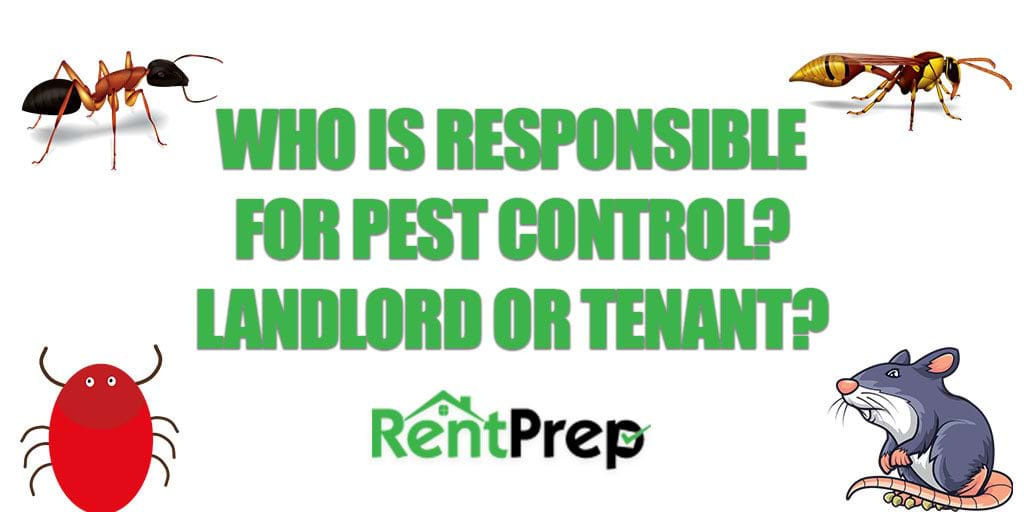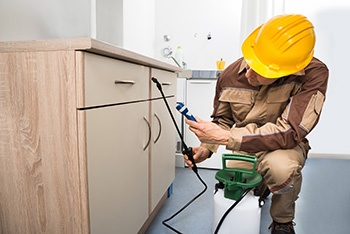Is It Safe to Use Pest Control Around a Babies

Author
August 13, 2015
Posted On
Categories

Updated August 2021
When bugs and other pests make their way into rental properties, it can cause conflict between tenants and landlords as to who is responsible for pest control. It's a part of your responsibility as the landlord to ensure that pests are not able to infiltrate the property, but the tenants share in some aspects of that responsibility as well.
How do you determine who needs to take care of the problem and who is financially responsible for it?
Pest problems need to be handled immediately when they happen to prevent them from becoming huge issues. It might not seem like much if someone sees a single roach or ant, but just a single bug is a sign of a much bigger problem. Are you prepared to handle those problems?
In this blog, we will cover who is responsible and how you can identify and remove the pest.
A Table Of Contents For Apartment Pest Control:
- Apartment Pest Control Legal Advice
- Who's Responsible For Pest Control?
- Landlords: What To Do When Tenant Reports Pests
- Checking Lease Agreement
- Steps For Protecting Investment
- How To Document Pests
- Who Pays For Pest Control?
- When Landlords Should Pay For Pest Control
- When Tenants Should Pay For Pest Control
- Tenants: What To Do When You Find Pests
- Tenant Rights For Pest Control
- Withhold Rent
- Move Out & Break The Lease
- Move Into Temporary Housing
- Hiring Specialists To Keep Pests Away
- Hire Seasonal Pest Prevention Treatment Provider
- Seal Up The Property
- Conduct Thorough Inspections
- DIYing Pest Control For Rentals
- FAQs On Landlord Pest Control
You can click any of the links above to jump to that topic on this page.
A Word Of Caution…
Before we break down pest control and who's responsible between the landlord and tenant, it's worth stating this.

Pests, vermin, and other uninvited house guests are dangerous to the health of the occupants. This means that you, as a landlord, have a responsibility to ensure the problem is corrected as soon as possible. You should always be ready to front the bill for pest problems; you can deal with determining financial responsibility later.
The first action should be remedying the issue regardless of who is responsible.
If you're a tenant with an unresponsive landlord, don't let their negligence affect your well-being. Take care of the issue through DIY methods or by scheduling an appointment with a pest control service.
If you're a landlord, you can call and schedule an appointment with a pest control service and, if you manage to fix the issue in time, you can cancel the appointment. Having this appointment documented will also prove in any litigation that remedial steps were being taken.
The first and most important step is to remedy the issue and then worry about who is financially responsible. Removing the disease-carrying insects and pests is priority #1.
Your job as a landlord requires you to ensure that the home your tenant is living in is safe and habitable. Even if you later discover that the tenant is responsible for the pest problem, your immediate responsibility is to get the pests out of the property ASAP.
Apartment Pest Control Legal Advice
We prepared some of the most commonly asked questions for Avvo's legal team. Esther is part of the General Counsel for this online legal service.
Note: We've made transcription notes beneath the video for quicker reference too.
Transcription Notes for renter pest control video
[1:10 – 3:00] How Does The Lease Play Into Pest Control And Who Is Responsible?
Landlords are responsible for pest control and keeping infestations away but there are situations where a tenant can have living behaviors that lead to an infestation and in those cases, a tenant can be responsible for taking care of pest control. Generally, the landlord is responsible, but if a landlord can prove the tenant caused the infestation the tenant would be responsible.
[3:01 – 3:50] Rental Lease: How To Word Pest Control
The lease should say that the landlord is delivering the unit in good condition and is responsible for pest control. Have a mention that any infestation due to the tenant's doing than the tenant will be responsible.
[3:51 – 4:50] Document History Of Pest Issues
It's important the landlord documents the history of pest issues. If the tenant is creating pest issues due to garbage and unhealthy living conditions the landlord should document this.
[4:51 – 6:55] Does It Matter What Type Of Vermin It Is? Termites vs. Bed Bugs, Mice, And Rats etc.
Generally, the type of infestation is what you'll look at first. If it's something that is common to the area or to that building than it will generally be the landlord's responsibility. Bed bugs are on the rise and legislation depends on state and local laws. Typically the onus falls on the landlord here.
[6:56 – 7:47] Warranty Of Habitability
Termites can cause structural damage and landlords have an obligation to keep a warranty of habitability. There is legislation passed in California where it doesn't list termites by name, but it's still the landlord's responsibility to take care of this due to issues of safety in the building.
[7:48 – 9:19] Can A Tenant Legally Withhold Rent Until Pest Control Issues Are Taken Care Of?
This depends. If the tenant has given written notice to the landlord of the infestation the landlord needs to take care of this. Each state has their own laws on how quickly a landlord responds and if tenants can withhold rent.
Sidenote: You can also subscribe to the "RentPrep for Landlords" Podcast using any of the links below.
Subscribe: iTunes | Android | Google Play | Stitcher | TuneIn | RSS
Who Is Responsible For Pest Control In A Rental Property, Tenant Or Landlord?
The landlord is almost always responsible for the general pest control at a property. Whether that means ensuring the property is protected from common local pests to having the property regularly treated against pests, these things fall into the scope of landlord responsibilities.
As a landlord, you must do your part to prevent your buildings and single-family properties alike from having pests. Calling for an exterminator or other pest control company whenever an issue arrives should happen immediately.
It can be stressful and you may want to research if the tenant is responsible, but the pests need to be controlled immediately regardless of who is responsible for the financial aspect of the treatment.
Think of it this way. Even if the tenant wasn't living there or is responsible, you still want the pests to be out of your property to protect its integrity.
Steps To Take When A Tenant Reports Pests
There are a few basic steps to take when a tenant reports a pest on your rental property.
Check Your Lease Agreement
Pest control responsibility should always be included in the lease agreement. Usually, landlords include a pest control clause in their rental agreement and specify the potential issues around pest control is a good way to determine responsibility.
Protect Your Investment
A good landlord usually won't want to leave seasonal pest control up to the tenant, as things may not get done to their satisfaction. Though the tenant has the right to live in the property, it is still your property in the grand scheme of things. It is important to protect your investment by doing regular, thorough pest prevention treatments .
If you are working with a property manager or thinking about hiring a property management company, ask them about what types of pest control they include and how any pest issues would be handled as well.
Document The Cause
If the landlord can document that the tenant is responsible for the infestation, they may be able to have the tenant pay for pest control. This can be done by setting up a rental inspection and give the tenant proper notice beforehand. Take pictures of the environment that may be leading to the pest issues.
Who Pays For Pest Control Landlord Or Tenant?
Pest control isn't cheap, so the issue of who is financially responsible can create some tension in both parties. It's normally the responsibility of the landlord or owner to contract with a pest control service to maintain the structures, whether a multi-unit building or single-family home.
Now that you have a better idea of what pest control is and what it might entail, let's get into a more thorough breakdown of the financial responsibilities of pest control. As mentioned above, you should handle the problem quickly, but being aware of what you need to do to determine financial responsibility along the way is also important.

When Landlords Should Pay For Pest Control
The implied warranty of habitability means that landlords must maintain livable conditions in a rental property.
A pest infestation is one of those things that will jeopardize that condition. So, for the most part, it's up to the landlord to arrange and pay for pest control .
If the infestation is due to natural circumstances, the landlord is responsible for taking care of the problem. In other words, if the rental property is located near a grassy field and the tenant reports mice, the landlord needs to arrange for and pay for the exterminator.
Other natural pest conditions might include termites, spiders, ants, rats, wasps, and sometimes cockroaches and bedbugs.
Most landlords make arrangements for seasonal maintenance and prevention, as well as for immediate pest control, and pay for it on their own, so the problem does not get any worse.
However, just because a landlord makes all the arrangements don't always mean they foot the bill in every case.
When Tenants Should Pay For Pest Control
If a pest infestation can be linked-to tenant behavior or actions, it's then up to the tenant to bear the financial burden. Some pests, like ants or cockroaches, are attracted to areas that are unclean . If the tenant has trouble with taking out the garbage regularly or keeping food covered in the kitchen or pantry, it can attract pests.
Excess moisture from poor upkeep or non-reported leaks can also attract certain pests. A flea infestation may also be the result of a tenant's pet, and would, therefore, be up to the tenant to foot the bill for treatments.
In these instances, the exterminator can help the landlord determine whether or not the tenant's living conditions are attracting the pests. Poor housekeeping, moisture, or infestation due to pets that are documented can mean that the financial responsibility of pest control can be passed to the tenant.
Also, landlords who discover such living conditions or pet conditions may want to issue a comply or quit notice to ensure the tenant won't be attracting more pests to the property again and again.
Tenants: Here's What To Do When You Find Pests
- Report the problem to the landlord immediately, and request that they let you know the appointment time for pest control.
- Clean up any trash, dirt, or other areas that could be contributing to the problem.
- Check the lease agreement for details about pest control management. Some leases say that the responsibility falls on tenants after move-in; others say it is always the landlord's responsibility.
- Take action if the landlord doesn't get the pests under control.
- Check state and local laws about pest control management.
Tenant Pest Control Rights
When a landlord fails to provide pest control that is not the result of a tenant's action, a tenant then has the ability to:
Withhold Rent
In many states, tenants are able to withhold rent from their landlords whenever serious problems are not being addressed in a timely manner. If you do not clear the pest problem, your tenants may be permitted to withhold rent until you remedy the issue.
Move Out & Break The Lease
In cases of serious infestations or in states where the laws are very strict, tenants may be able to move out immediately when an infestation is discovered. If you work in one of these states, ensure that you are doing regular, seasonal preventative pest treatments at your properties. If the tenant moved out, you should document the process in great detail.
Move Into Temporary Housing
Tenants may be able to move into temporary housing and then deduct the cost from their next month's rent until the problem is fixed. Again, the rules about this will depend on the state laws as well as the terms of the rental agreement. If the problem isn't solved in a reasonable amount of time, the tenant could go on to break the lease.
Hiring Specialists To Keep Pests Away From Your Rental
Preventative pest control should be done at least seasonally, but the exact amount of time spent on pest control is going to depend on the location, property, and type of housing.
There are a few things you should ensure that you do regularly to prevent pests from being able to infiltrate your property.
Hire Seasonal Pest Prevention Treatment Provider
Set up a service to come in every season and do pest prevention treatments . These treatments often include spraying around the outside of the house, looking for signs of infestation, and treating the baseboards inside of the house. Through this regular preventative care, you can make it less likely to have pest problems.
Seal Up The Property
Before any tenants move in, have a pest control specialist visit your property and point out any potential problem areas. This would include gaps where pests can get in, unsealed pipes, and more. The specialists will be able to advise you about additional prevention tactics that can help.
Conduct Thorough Inspections
Be sure to do thorough inspections between tenants and in yearly rental inspections. If pests are a common problem in your area, you may even want to have a specialist come to do their own inspection each time that you do a rental inspection.
Do It Yourself Pest Control For Rentals
Pest control is not cheap when hiring out an exterminator. That's why many will search for a DIY pest control solution.
We've found Do It Yourself Pest Control Supplies to be one of the most helpful services.
When you go to their homepage, you immediately see pictures of a variety of pests. You can click and choose the current pest you are dealing with at your rental property.
Once you click any of those images, you'll be taken to an educational page on that pest.
For example, when you click "Roach Control," you'll be taken to a page where you can choose the type of roach you are dealing with and various options to get rid of the roaches. The page includes this helpful video.
The combination of helpful video tutorials and available products makes Do It Yourself Pest Control Supplies a helpful resource for DIY pest control.
Rental Property Pest Control FAQ's
Here are some frequently asked questions on apartment-related pest control questions.
Who Is Responsible For Bed Bugs Landlord Or Tenant?
Bed bugs are on the rise across the country, and many places, like New Hampshire , are passing new laws to try to curb their growth. There may be different rules in place when it comes to a bedbug infestation than for other types of pests.
It's important for landlords to be up to speed on bedbug laws in their area before they receive a panicked phone call from their tenants.
Bed bugs are notoriously difficult to get rid of, and they are easily transported from one place to another on clothes, luggage, skin, and more. If a rental property is bed bug-free at turnover, and an infestation occurs, it is most likely the responsibility of the tenant to get rid of them.
However, if the rental property has a history of bed bug infestations, it is most likely up to the landlord to take care of it, since the infestation may not have been completely effective.
It's worth it for landlords to check up to see if their city or state has enacted any laws about bed bug infestations in rental properties and make sure to comply with those laws in the event of an infestation.
How Long Does A Landlord Have To Take Care Of Pests?
If a tenant contacts a landlord about a pest infestation, it's important the landlord act immediately and then sort out finances down the road. Failure to act on a pest infestation could mean legal trouble and the tenant might be within their right to withhold rent until the problem is fixed.
There's no reason landlords cannot respond with an exterminator appointment within a few days after notification from the tenant.
In order to protect themselves from any conflict or legal action down the road, it's vital for landlords to document everything relating to the infestation, such as when the tenant first reported it, what action the landlord took, the invoice and notes from the exterminator, and any other interaction from the parties.
Do I Need To Hire Pest Control Seasonally?
Many landlords address pest control in the lease agreement, especially when there are no state or municipal laws on the topic.
One option is that the landlord agrees to turn over a pest-free unit to the tenant and do seasonal maintenance, and then any pest infestations are the responsibility of the tenant.
Another option is for the landlord to arrange for regular preventative pest control services, usually four times per year, and the tenant is responsible for anything outside those scheduled visits.
No matter how pest control issues are worked out, it's important for them to be discussed in detail prior to signing the lease so both parties are clear on who is responsible for what.
Who Pays For An Exterminator In A Rental?
As mentioned above, it is important to act quickly and exterminate any pest problems immediately. This means that landlords should pay for the extermination when it is initially scheduled to ensure there are no delays while sorting out the finances.
When you pay for the extermination, make sure to keep all documentation. Ask the exterminator or pest control specialist to document any potential sources or causes of the infestation while they work, as this might help you to determine who will ultimately foot the bill.
If the tenant has created conditions where pests can thrive that you have otherwise worked to prevent, they may be held responsible for the bill. If, however, the tenant has kept things clean and orderly, the bill is going to remain yours.
Is The Landlord Responsible For Roaches?
Cockroaches in apartment laws are searched frequently because cockroaches are one of the most common pests that renters deal with. The video above covers how to remove cockroaches, but not what the laws are surrounding them. This will depend on your state and city laws. In California law, it is clear that cockroaches are the responsibility of the landlord.
Can A Tenant Break Their Lease Because Of Roaches?
Yes; a tenant could break their lease with you if there are roaches and you do not handle them appropriately or quickly enough.
Living with pests like roaches is considered to be a health hazard because of the issues that pests can cause, and that means that roach issues must be dealt with immediately.
If a tenant approaches you with evidence that there are roaches at the property and you do not act to fix it within a reasonable amount of time, they could reasonably break their lease or withhold rent. Even if you are suspicious of the cause of the roaches, you must act to remedy it immediately, and then deal with the fallout later.
Are Mice In Apartment A Landlord Responsibility?
This will depend on the natural state of the apartment. If there are mice in the apartment, the landlord may be responsible if there is a history of infestation. If the apartment is located next to a grassy field, this may be a natural reason for mice in the apartment. If the tenant's living conditions lead to mice in the apartment (e.g., garbage is not being taken out regularly), then the tenant could be liable. In all instances, each state and city will have different laws on who is responsible.
Are Landlords Responsible For Ants?
Similar to other pest infestations, landlords will be responsible based on state and local laws along with what the lease says. Ants are many times due to food being left out in the open. In these scenarios, the tenant would be responsible for ants in the rental property because it's due to tenant neglect. Ants are one of the easier pests to track and eradicate .
What Are The Tenant's Rights If An Apartment Has Roaches?
As it is largely a landlord's responsibility to prevent and remedy any bug issues, what can your tenants do if the apartments have roaches?
It's important that you are familiar with your tenant's rights in this process. Not only can you keep communication open by talking through a roach infestation with your tenant clearly, but it can also help you to be more prepared.
Are Landlords Responsible For Pest Control In California?
The simple answer is that yes, landlords are responsible for pest control in California. As of 2016 , they must notify tenants that they are performing pest control if they are doing it themselves. It's a good idea to read up on the Structural Pest Control Board PDF here .
Be Prepared To Fight Pests
The simple fact of the matter is that even the most well-prepared landlords might face a pest problem at one time or another. Whether or not your tenant or you are ultimately responsible for the cost of the pest control treatment, you need to be prepared for how to go about handling these issues.
Remember, it is your job to:
- Do your part to prevent pests through preventative treatments
- Inform tenants of their responsibilities regarding pest control
- Quickly schedule appointments to remedy any pest problems
Pests are a serious concern, and they are a health concern as well. This means you must fix pest problems quickly or you could risk being held liable for more than just the cost of the extermination. Take pest control seriously, and you are less likely to ever face these issues!
Is It Safe to Use Pest Control Around a Babies
Source: https://rentprep.com/property-maintenance/responsible-pest-control-landlords-tenants/
0 Response to "Is It Safe to Use Pest Control Around a Babies"
Post a Comment